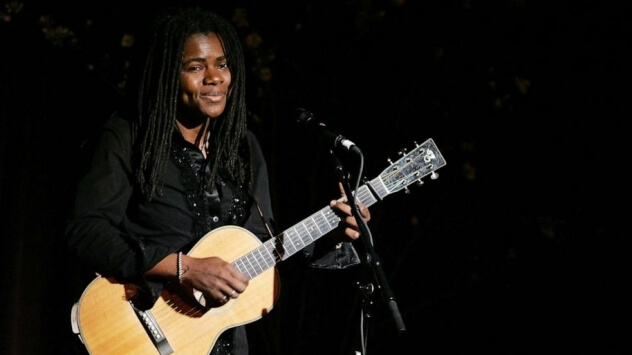“I’d rather have 100,000 people taking interest in something and become active supporters of it than have 1,000 people just buy something.”
On May 12, 2008, the legendary American producer Steve Albini shall play live in Sofia, Bulgaria with his band Shellac. This was the reason to call him on the phone and talk about the work in the studio, the live experience and the music business in general…
Vassil Varbanov: Steve, we know you’re at your studio, so what are you up to now?
Steve Albini: Today I’m doing kind of an unusual project – a band who’s been up to have a song on a video game where people pretend to be on a band and play instruments. They needed some copies of their master tape, but broken down into a format that the video game could play back for one people could play it along.
V. V.: Was it easy?
S. A.: Oh, it was only one song and we were done before we ordered lunch, so it was no big deal.
V. V.: Let’s talk about Shellac now. On May 12, 2008 you’re going to have your first ever show in Bulgaria. What’s the Shellac live experience like?
S. A.: We see the live performances as the main focus of the band. The records are sort of occasional documents of what the band is doing, but when we play live, that’s more of the true personality of Shellac, because the three of us are interacting with each other and with the audience, we’re doing some stuff extemporaneously, we’re doing stuff that’s a more visual or more physical part of the band rather than just the sound coming out of the speakers… So the live experience is more important to me than recordings are.
V. V.: Probably because it’s like being a good cook…
S. A.: Well, yeah, I suppose… I guess the way we look at it is that every show is a chance to run and experiment using ourselves and our music as test subjects. Every night, every show, every audience, every opportunity to play is a little bit different, so we learn a little something every night and also try a few experiments.
V. V.: Having the live audience there makes it physical, and this makes a difference probably…
S. A.: I admit that being in a band is a very selfish experience for us. We’re primarily interested in what we like and what we want to do, so we’re not performing for the audience in this sort of showbusiness sense. However, it is important to have other people there, as it tightens your sense of concentration. You can make a fool of yourself in the practice room and it’s not that embarrassing, but if you make a fool of yourself in front of a hundred people, it’s more embarrassing, so it puts more pressure on you.
V. V.: Support for your show in Bulgaria will come from this one-girl project from Berlin, Germany called Allroh. Tell us something more about it.
S. A.: Her real name is Anne Rolf, and she’s a brilliant guitar player and singer. She used to be in a two-piece band called Wuhling – just with drums and guitar and singing, and eventually they added a bass player – but that was kind of 15 years ago. Now she’s just doing solo performances where she plays guitar and sings. She came to Chicago and played a show with us, and we thought she was fantastic, so we’re bringing her on these European shows for a number of reasons – we think she’s really fantastic and we hope other people will like her as well, and it’s also very easy touring with another band that has only one person, he-he!
V. V.: Which is the best movie that you’ve seen recently?
S. A.: I have to admit I don’t follow movies very much. I don’t particularly like movies as an art form and I’m not very knowledgeable about them, so I’m probably exactly the wrong person to ask.
V. V.: Do you listen to music while trying to fall asleep?
S. A.: Not intentionally, but sometimes my girlfriend is playing something when I go to sleep. In private I tend not to listen to listen to music that I’ve been working on in the studio. For example, if I’m working on something really explosive and aggressive in the studio, when I’m at home I probably will be listening to something very quiet.
V. V.: When Radiohead put their latest album “In Rainbows” for free download last year, they said they can afford it, because they’ve made their money. It’s tough for young bands to do a thing like this…
S. A.: Oh, I disagree. Young bands, more so than a band like Radiohead, can use this free distribution of music as a kind of a promotional tool. In the days before the Internet distribution of music, when there were only record stores and physical distribution on CDs and LPs, it was difficult to get your records promoted, so bands which were sending promo copies of their records to journalists and booking agents spent a lot of money to distribute just their music. Now that can be done for free. If a band is trying to increase the profile of the band as a whole, then using this free distribution of music is a very good promotional tool. If you’re trying to sell physical records – maybe that’s not the best idea if no one is familiar with your band. I’m of the opinion that once people hear your band and become fans, then eventually they’ll buy the physical record, and you have a long time to make that transaction. If you create a fan of your band and that person is a fan for life, you probably have 20 years during which you can sell them a CD. You don’t need to sell the CD immediately – that doesn’t need to be the beginning of your relationship with your audience.
V. V.: Probably you feel like attracting them to come to your show?
S. A.: Yeah, or just to make them interested in the band, as that means they’ll eventually buy your records or come see you play or get interested in some project of yours. This may or may not involve a transaction of money, but in any case the audience becomes aware of the band and that’s the first step. Personally I’d rather have 100,000 people taking interest in something and become active supporters of it than have 1,000 people just buy something and that’s the last you ever hear from them.
V. V.: Is there any band that you’ve discovered by yourself through the Internet that made you wanna call them with an offer to produce them?
S. A.: No, I don’t make phone calls like that. I feel uncomfortable putting myself in front of somebody that way – I feel that puts them in an awkward situation. I wait for the phone to ring and then I answer it, and whoever is on the other end – that is the record I work on.
V. V.: When we see your producer’s portfolio, it’s more indie rock stuff in there, like Nirvana, The Breeders and Bush, but you also took part in producing the Page & Plant album. Is it because you got to be more mainstream, or these two guys have become more independent?
S. A.: I think it’s obvious that Jimmy Page and Robert Plant are in every sense of the word independent – they’re independent thinkers, they’re not beholding to anyone, they do what they want. That is transparently obvious – that they have their own agenda and are not concerned what anyone else says about them. Having said that, it’s also true that the great majority of the small underground bands that I’ve worked with don’t have not anyone to answer to and are not responsible to anyone else, and they’re doing exactly what they want to do. In a strange way you have people at the very, very top of success of the music business and people who are just starting out that don’t have to answer to anyone else, no one is expecting anything from them, no one is telling them what to do. I’m perfectly comfortable in either case. There are some people who are in sort of a strange political relationship with their record label, where the latter is having expectations and is telling them what to do – maybe it has even some legal threat to them. Bands in that situation have my sympathy, because I don’t know how they can deal with it.
Copyright: Tangra Mega Rock

